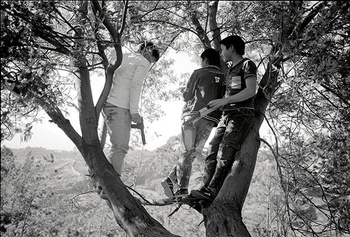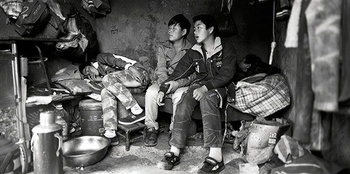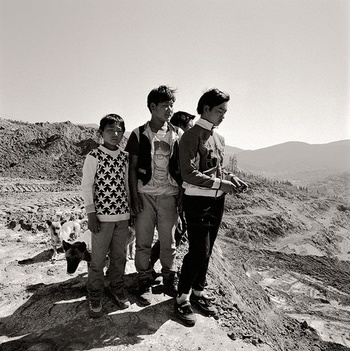Next to “Beijing Silvermine”, Galerie Paris-Beijing is showing the work of the Chinese film-maker and photographer Wang Bing. “I am a traditional person and I make traditional films,” he observed in an interview with Mentha Project. One can only admire the modesty of the man, who won international fame with the epic, three-part, nine-hour-long documentary West of the Tracks and whose bleak, stylised, painfully realistic The Ditch was the revelation of the Venice Film Festival in 2010. The slow decline of one of China’s great industrial regions in the 1990s, with its factories and residential districts emptying and its workers losing both their employment and their homes, is the subject of West of the Tracks. “We wanted to create a world, but in the end this world collapsed,” Wang stated early this year, on the occasion of a screening at YU Contemporary in Portland. “I filmed the life of the working class, their relation to society, and the traces their lives had left behind. If you see my film together with things from the last few decades, you can see what people have been doing over the decades in this country, what they have been dreaming of, and if their dreams have come true. This is a very important issue, because it tells us how we might live in the future.”
Wang Bing’s work is deeply rooted in China’s social and political history. Despite the tough realism of his subject matter, as a film-maker he uses the camera in such a sober, and yet poetic and honest, way that he raises observation to the level of true art. Three Sisters, in which he presents the everyday lives of three sisters in a remote mountain landscape in Yunnan province, is a beautiful example of what we mean. Life at an altitude of 3,200 metres is not exactly easy, but the motherless little girls are both heart-warming and heart-rending to observe.
Wang Bing: observation as an art form


Wang often lets himself be guided by chance encounters. While making The Ditch, his first fiction film, he came across a silent recluse living in a cave, a meeting that resulted in the silent portrait Man with No Name. It was during the filming of Three Sisters that he ran into the protagonists of the work that will go on display in Galerie Paris-Beijing. Father & Sons, which is both a cinematic and a photographic work, follows the miserable day-to-day existence of Cai, who left the Chinese countryside in order to work in a factory in Yunnan, and his two sons. While Cai works nights in the factory, the boys share the only bed in the four-square-metre room where they live. Bing lets us feel the appalling boredom by using long shots – a technique for getting under people’s skin that is a trademark of his. The black-and-white photographs on the wall show, among other things, how the boys pass the time during the day, playing with dogs, climbing trees, and throwing stones.

If the exhibition at Galerie Paris-Beijing whets your appetite and you want to see more work by this humane master, take note that, starting on 27 October, Cinematek is devoting a month-long cycle to him that will include all the films mentioned above and more, as well as a new photographic exhibition and installations never previously exhibited.
WANG BING: FATHER AND SONS • 20/9 > 1/11, di/ma/tu > za/sa/Sa 11 > 19.00, Galerie Paris-Beijing, Hôtel Winssinger, Munthofstraat 66 rue de l’Hôtel des Monnaies, Sint-Gillis/Saint-Gilles, 02-851.04.13, www.galerieparisbeijing.com
WANG BING: FATHER AND SONS • 20/9 > 1/11, di/ma/tu > za/sa/Sa 11 > 19.00, Galerie Paris-Beijing, Hôtel Winssinger, Munthofstraat 66 rue de l’Hôtel des Monnaies, Sint-Gillis/Saint-Gilles, 02-851.04.13, www.galerieparisbeijing.com
Fijn dat je wil reageren. Wie reageert, gaat akkoord met onze huisregels. Hoe reageren via Disqus? Een woordje uitleg.